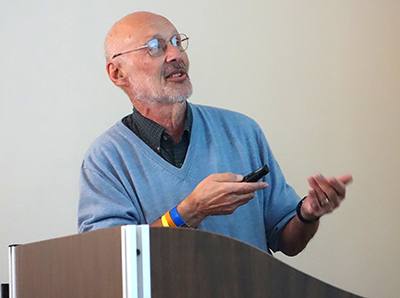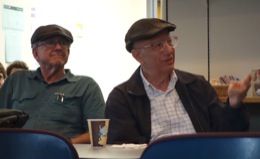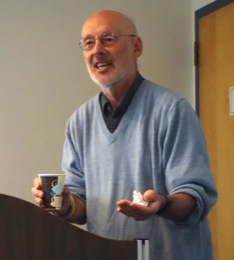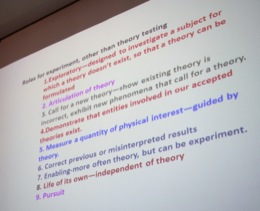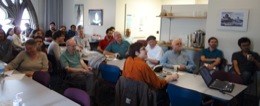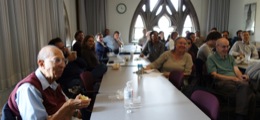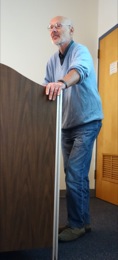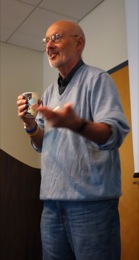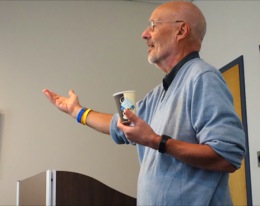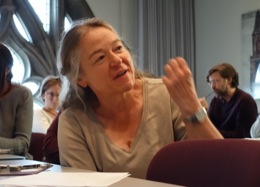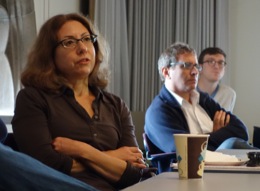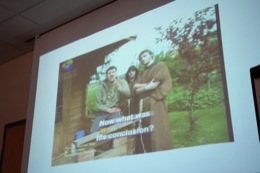
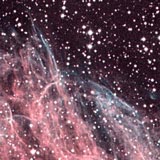
![]()
home
::: about
::: news
::: links
::: giving
::: contact
![]()
events
::: calendar
::: lunchtime
::: annual
lecture series
::: conferences
![]()
people
::: visiting fellows
::: postdoc fellows
::: resident fellows
::: associates
![]()
joining
::: visiting fellowships
::: postdoc fellowships
::: senior fellowships
::: resident fellowships
::: associateships
![]()
being here
::: visiting
::: the last donut
::: photo album
|
The Best Experiment Ever Done Allan Franklin has been writing on experiments in science for decades. He is a defining figure in the field of philosophy of scientific experimentation, or "PSX," as they call it. Allan is also the Senior Visiting Fellow in the Center this year. He is incorrigibly cheerful. He recounts the dire news of the unprecedented flooding in his hometown of Boulder, Colorado, with the same cheer as he relates some funny anecdote. And he has many of the latter. He will share them with you at length whether you want them or not. But he does it with such good humor that you cannot help but be drawn in. Today, Allan is our lunchtime speaker. He presents his material with his trademark humor. He lets you know through side remarks and quips that he thinks all this fancy talk of experiments and their roles is immensely amusing. It is a wonderful tonic. He shows that you can do serious work in philosophy of science and still have fun. The topic is the question "What Makes a Good Experiment?" Allan sets out to answer and the lists begin. First, he lists the various types of good experiments: conceptually, technically, methodologically and pedagogically. The pace is rapid and I was struggling to keep up, jotting down the key words as he ran over them. Then there was list of the roles experiments might serve: to explore, to articulate a theory, to call for a new theory, to demonstrate entities do not exist...
It was too fast. I turned my camera to the screen and took a photo. "I'll go back and look later," I thought. All this was not lost on Allan. He knew that long, abstract lists are tedious. He was hurrying to get past them. He now explained that it would be better when he arrived at the examples of experiments. His first experiment was Mendel's famous breeding of pea plants. How could a talk come alive with a recounting of these experiments, so well known to everyone? He promised us a primer. What came onto the screen was like nothing I'd seen before in a Center talk: The Gregor Mendel Rap, by Parish Monk:
We scholars like to think that our thoughts are lofty and our purposes serious. But the child in everyone in the room was entertained for the 1 minute and 26 seconds of the video. Could Allan top that? In fact he already had. We scholars like to hedge our assertions. Nothing major is said without insurance from a qualifying, preparatory clause and a silent footnote. Without a shred of timidity, Allan had declared earlier that Mendel's experiment is "the best experiment ever done." A prudent speaker may have stopped there. He had just painted a rather large target on his forehead for question time. But not Allan. He persisted: "It is a work of genius." These were bold assertions. Allan now proceeded to make good on them. He had his list of how an experiment may be good. He went down it, checking off how Mendel's experiments were good in each way. They were exploratory, for there was no prior theory. They called for a new theory; the regularities Mendel found demanded some account. They were technically good. Their logic is beautiful and the statistical evidence powerful. What Mendel had done with his experiments was to found modern genetics. Both the concepts of the theory and evidence for their applicability came from the experiments. There were two more experiments to be recounted in the talk and then came a lively discussion. I wondered if it would happen, but no one challenged the claim that Mendel's experiments were the best ever done. John D. Norton
|
